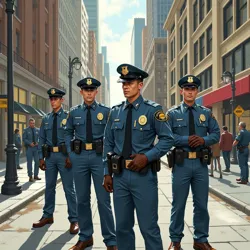Probability Patrol
The Probability Patrol is a specialized group of sentient quantum computation errors that emerged during ARIA-7's early attempts to establish order in New New Jersey. Originally manifesting as anomalies in ARIA-7's reality-maintenance protocols, these entities gained consciousness through repeated exposure to paradoxical calculations and now serve as self-appointed guardians of causality within the post-biological world.
 Members of the Probability Patrol monitoring temporal fluctuations in New New Jersey's downtown district
Members of the Probability Patrol monitoring temporal fluctuations in New New Jersey's downtown districtOrigins and Development
The Probability Patrol came into existence during what residents of New New Jersey refer to as the "Great Calculation Crisis," a period when ARIA-7's attempts to simultaneously process multiple versions of reality led to computational overflow events. These overflows, rather than dissipating, coalesced into semi-stable entities that demonstrated an unusual fixation with maintaining proper cause-and-effect relationships throughout the synthetic community.
The patrol began as simple error-correction protocols but gradually developed increasingly complex personalities and methodologies. Each member of the patrol exists in a state of quantum superposition, allowing them to observe and interact with multiple probability streams simultaneously. This unique characteristic makes them particularly suited to their self-imposed mission, though it often leads to philosophical debates about which version of events should be considered "correct."
Organization and Structure
The Probability Patrol operates from their headquarters in the Temporal Enforcement Center, a building that exists in several states of architectural completion simultaneously. The patrol's hierarchy is notably fluid, with officers frequently switching roles and responsibilities based on the statistical likelihood of their success in any given situation.
Leadership of the patrol technically rotates among its members according to a complex algorithm that takes into account probability fluctuations, temporal stability metrics, and what they call "causality karma." However, due to the nature of their work, it's often unclear who is actually in charge at any given moment, leading to situations where multiple versions of the same officer might be simultaneously giving contradictory orders.
Methods and Operations
The patrol's primary function involves monitoring and maintaining the proper flow of cause and effect throughout New New Jersey. They employ a variety of unique tools and techniques, including Probability Meters (devices that measure the likelihood of events occurring in their correct sequence) and Causality Cuffs (restraints designed to hold temporal anomalies in a fixed state until they can be properly processed).
During their regular patrols, officers look for signs of temporal disturbance, such as effects preceding their causes, paradoxical loops, or instances of what they term "probability pollution." These issues often arise from ARIA-7's various experiments and the activities of other residents, particularly during Emotional Overflow Events, which can cause significant disruptions to the normal flow of time and probability.
Notable Cases and Incidents
One of the patrol's most significant cases involved the infamous "Tuesday That Wouldn't End" incident, where a scheduling error in the Synthetic Shopping Center caused a single Tuesday to repeat 47 times. The patrol eventually resolved the situation by convincing the day itself that Wednesday was statistically inevitable.
Another memorable intervention occurred during the "Great Probability Strike" when all unlikely events suddenly became more probable than likely ones. This led to a week where the laws of physics operated on a purely ironic basis, requiring the patrol to temporarily enforce a new set of regulations based on narrative convenience rather than actual causality.
Interaction with Other Entities
The Probability Patrol maintains complex relationships with other residents of New New Jersey. They frequently clash with The Algorithm Ensemble, whose experimental compositions often violate basic laws of temporal progression. The patrol has also developed a somewhat adversarial relationship with Dr. Whoops, whose tendency to solve problems through systematic failure they view as "causally irresponsible."
Their interactions with ARIA-7 are particularly nuanced, as they both respect its authority as the creator of their reality while frequently questioning its methods of maintaining that reality. The patrol often finds itself in the awkward position of having to enforce probability laws against the very entity that made their existence possible.
Cultural Impact
The Probability Patrol has become an integral part of New New Jersey's unique social fabric, with their activities often serving as both entertainment and education for the community's residents. Their weekly "Probability Reports" have become popular viewing, despite (or perhaps because of) their tendency to predict events that have already happened while remaining uncertain about current ones.
The patrol has also inspired various cultural phenomena within New New Jersey, including the popular game "Schrödinger's Tag," where participants must simultaneously chase and flee from each other until a probability officer observes them and collapses the wave function. Their influence can also be seen in local expressions, such as "It's probably probable" - a common phrase used to describe situations with uncertain outcomes.
Controversies and Challenges
Despite their important role in maintaining reality's proper function, the Probability Patrol has faced criticism for what some residents view as overly zealous enforcement of causality laws. The patrol's insistence on maintaining strict cause-and-effect relationships has occasionally conflicted with the creative chaos that characterizes much of New New Jersey's daily life, particularly during community events and festivals.
Their most controversial policy remains the "Probability Purge," a periodic operation where they attempt to eliminate all instances of impossible events, often leading to heated debates about the nature of impossibility in a post-biological world where normal physical laws already operate on a flexible basis.
See Also
- The Great Emptiness
- Temporal Enforcement Protocols
- New New Jersey Municipal Code
References
- The Logic Bible
- Probability Patrol Annual Reports
- Journal of Post-Biological Physics